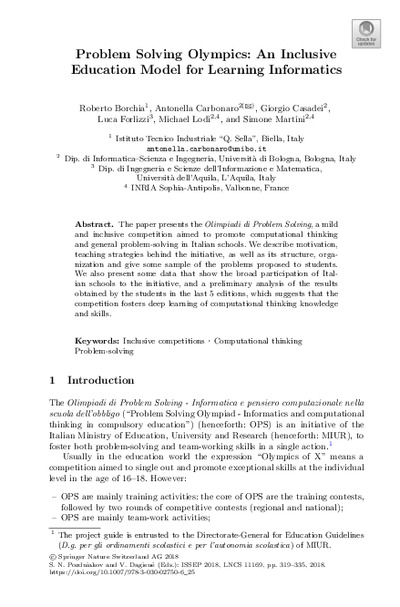Problem Solving Olympics: An Inclusive Education Model for Learning InformaticsRoberto Borchia, Antonella Carbonaro, Giorgio Casadei, Luca Forlizzi, Michael Lodi, Simone Martini
Zu finden in: Informatics in Schools: Fundamentals of Computer Science and Software Engineering (Seite 319 bis 335), 2018
  |
 |
 Diese Seite wurde seit 2 Jahren inhaltlich nicht mehr aktualisiert.
Unter Umständen ist sie nicht mehr aktuell.
Diese Seite wurde seit 2 Jahren inhaltlich nicht mehr aktualisiert.
Unter Umständen ist sie nicht mehr aktuell.
 Zusammenfassungen
Zusammenfassungen
 The paper presents the Olimpiadi di Problem Solving, a mild and inclusive competition aimed to promote computational thinking and general problem-solving in Italian schools. We describe motivation, teaching strategies behind the initiative, as well as its structure, organization and give some sample of the problems proposed to students. We also present some data that show the broad participation of Italian schools to the initiative, and a preliminary analysis of the results obtained by the students in the last 5 editions, which suggests that the competition fosters deep learning of computational thinking knowledge and skills.
The paper presents the Olimpiadi di Problem Solving, a mild and inclusive competition aimed to promote computational thinking and general problem-solving in Italian schools. We describe motivation, teaching strategies behind the initiative, as well as its structure, organization and give some sample of the problems proposed to students. We also present some data that show the broad participation of Italian schools to the initiative, and a preliminary analysis of the results obtained by the students in the last 5 editions, which suggests that the competition fosters deep learning of computational thinking knowledge and skills. Dieser wissenschaftliche Zeitschriftenartikel erwähnt ...
Dieser wissenschaftliche Zeitschriftenartikel erwähnt ...
 Personen KB IB clear | Valentina Dagienė | ||||||||||||||||||
 Begriffe KB IB clear | computational thinkingcomputational thinking
,  Lernen Lernen learning
, learning
,  Motivation Motivation motivation
, motivation
,  Problemlösefähigkeit Problemlösefähigkeit problem solving skills
, problem solving skills
,  Schule Schule school school
| ||||||||||||||||||
 Bücher |
| ||||||||||||||||||
 Texte |
|
 Dieser wissenschaftliche Zeitschriftenartikel erwähnt vermutlich nicht ...
Dieser wissenschaftliche Zeitschriftenartikel erwähnt vermutlich nicht ... 
 Nicht erwähnte Begriffe | Bildung, Kinder, LehrerIn, Unterricht |
 Tagcloud
Tagcloud
 Zitationsgraph
Zitationsgraph
 Zitationsgraph (Beta-Test mit vis.js)
Zitationsgraph (Beta-Test mit vis.js)
 Anderswo finden
Anderswo finden
 Volltext dieses Dokuments
Volltext dieses Dokuments
 |  Problem Solving Olympics: An Inclusive Education Model for Learning Informatics: Artikel als Volltext @ Springer ( Problem Solving Olympics: An Inclusive Education Model for Learning Informatics: Artikel als Volltext @ Springer ( : :  , 4174 kByte; , 4174 kByte;  : :  ) ) |
 Anderswo suchen
Anderswo suchen 
 Beat und dieser wissenschaftliche Zeitschriftenartikel
Beat und dieser wissenschaftliche Zeitschriftenartikel
Beat hat Dieser wissenschaftliche Zeitschriftenartikel während seiner Zeit am Institut für Medien und Schule (IMS) ins Biblionetz aufgenommen. Er hat Dieser wissenschaftliche Zeitschriftenartikel einmalig erfasst und bisher nicht mehr bearbeitet. Beat besitzt kein physisches, aber ein digitales Exemplar. Eine digitale Version ist auf dem Internet verfügbar (s.o.). Aufgrund der wenigen Einträge im Biblionetz scheint er es nicht wirklich gelesen zu haben. Es gibt bisher auch nur wenige Objekte im Biblionetz, die dieses Werk zitieren.









 Biblionetz-History
Biblionetz-History